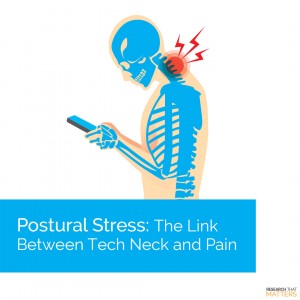
Bottom Line:
Postural stress occurs not only because of your anatomy but also because of the decisions you make each day. Believe it or not, many of us spend 2 hours or more per day on our smartphones or tablets. That adds up to hundreds, if not thousands, of hours each year! The position we hold our heads in while using these devices is referred to as “tech neck,” and over the past few years, the pain associated with these positions has been growing by leaps and bounds.
Why it Matters:
It’s estimated that tilting your head forward even 15 degrees can increase the weight of your head on your neck by over 3X. Tilting your head forward 60 degrees can nearly 10X the stress and strain on your neck. Over time, this forward head posture can result in spinal problems, disc damage, loss of motion, pain, stiffness, headaches and more. The good news about postural stress and tech neck is that a few simple changes to your routine can help you reduce your risk of experiencing pain.
- Tech neck is the term used to describe the flexed head and neck position that occurs when looking down at your smartphone.
- Even 15 degrees of forward bending (flexion) can increase the stress of your head on your neck by 3X.
- Taking breaks every 15 minutes and looking up from your phone or tablet can help your body reset and give your muscles a chance to relax.
Next Steps:
Reducing the symptoms of tech neck is more than merely changing the angle of how you look at your phone. By properly evaluating your ergonomics, we can make personalized recommendations to help your body help you maintain a more balanced posture. By reducing the stress on your neck, you can look forward to many years of continuing to enjoy your smart devices!
Science Source(s):
“Tech Neck” Taking a Toll on Posture. Columbia Spine. 2018.
